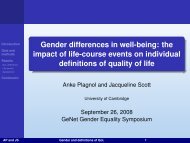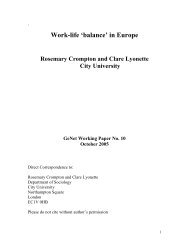Job insecurity, gender and work orientation: an exploratory ... - GeNet
Job insecurity, gender and work orientation: an exploratory ... - GeNet
Job insecurity, gender and work orientation: an exploratory ... - GeNet
You also want an ePaper? Increase the reach of your titles
YUMPU automatically turns print PDFs into web optimized ePapers that Google loves.
Brym<strong>an</strong> (2001) notes that the point of qualitative research is not to generalize to<br />
populations; rather, the point is to generalize to theory. To use the words of Mitchell<br />
(1983): ‘it is the quality of the theoretical inferences that are made out of qualitative data<br />
that is crucial to the assessment of generalizability’ (p. 29). Thus, one of the aims of this<br />
paper was to interpret the values <strong><strong>an</strong>d</strong> beliefs of particip<strong>an</strong>ts at a specific point in time.<br />
M<strong>an</strong>y interesting issues emerged, some of which resonate with previous research, others<br />
that offer new insights. It is import<strong>an</strong>t to emphasise, however, that this study makes no<br />
claim to be ‘proof’ of the existence of these themes in the population as a whole, rather it<br />
is <strong>an</strong> <strong>exploratory</strong> account of the experiences of this particular sample <strong><strong>an</strong>d</strong> offers a fertile<br />
base for further enquiry.<br />
The key aim of this paper, however, was to explore the ways in which ‘<strong>work</strong> <strong>orientation</strong>’,<br />
or the me<strong>an</strong>ing of breadwinning <strong><strong>an</strong>d</strong> caregiving, influenced particip<strong>an</strong>ts’ experience of<br />
job <strong>insecurity</strong>. There were clearly <strong>gender</strong> differences for some particip<strong>an</strong>ts in the priority<br />
attached to both <strong>work</strong> <strong><strong>an</strong>d</strong> family in situations of job <strong>insecurity</strong>, yet there were also some<br />
interesting points of commonality which are equally import<strong>an</strong>t to discuss. To recap, three<br />
groups emerged for women: ‘Bal<strong>an</strong>cers’, who w<strong>an</strong>ted some combination of <strong>work</strong> <strong><strong>an</strong>d</strong><br />
family, ‘Traditionalists’, who had prioritised home life <strong><strong>an</strong>d</strong> the ‘Ambitious’ who w<strong>an</strong>ted<br />
to involve themselves principally in professional activities. The largest group, the<br />
‘Bal<strong>an</strong>cers’ experienced a r<strong>an</strong>ge of responses to job <strong>insecurity</strong>: some saw it as a major<br />
crisis, with the loss of both fin<strong>an</strong>cial security <strong><strong>an</strong>d</strong> emotional support from colleagues.<br />
Others saw redund<strong>an</strong>cy as a way out of increasingly dem<strong><strong>an</strong>d</strong>ing lives, though at the cost<br />
of employment <strong><strong>an</strong>d</strong> promotion opportunities. Finally, some used the experience to<br />
reassess their values <strong><strong>an</strong>d</strong> adapted their priorities accordingly. Amongst the<br />
‘Traditionalists’, although buffered to some degree against fin<strong>an</strong>cial worry because of<br />
their husb<strong><strong>an</strong>d</strong>s’ salary, they nevertheless felt they would lose out on social contact. For<br />
the ‘Ambitious’, fin<strong>an</strong>cial difficulties were, once again, prominent, but a decline in<br />
org<strong>an</strong>izational commitment <strong><strong>an</strong>d</strong> <strong>an</strong> increasing sense of self-interest (in terms of career<br />
adv<strong>an</strong>cement) seemed import<strong>an</strong>t themes.<br />
26






